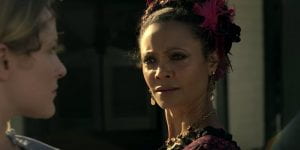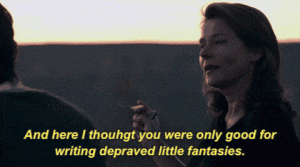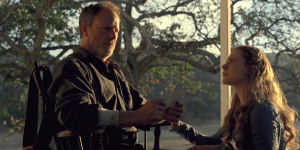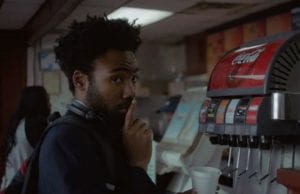One of the biggest struggles of narrators in the movie industry today is when to reveal the hidden intentions of characters in order to catalyze a plot and reach the peak captivation of a crowd. Westworld writers Lisa Joy and Dominic Mitchell decided to go about this in a pretty intriguing way: Hunger-Games, you-versus-the-world, fend-for-yourself style when they decided to initiate the path for all of the potential revolutionaries in episode five: Contrapasso. Although, the format does take away from the importance of each character like androids Maeve and Dolores or park tourists William or The Man in Black having the separate field of gravity around their eureka moment, it does bring in an interesting dynamic of screenplay of creating suspense at peaks because it allows the three stories that are destined to meet to investigate the parks various aspects to reflect on mankind.
The arguably most important moment of plot development comes with the union of William and Dolores in their search for the release of the androids “at the center of the park”. William, being a loner in the real world, is able to sympathize with the helplessness of Dolores in the park. However, we must value Dolores’s struggle as something more than that of an object, but one which is supposed to destroy the park completely due to the immorality of maltreatment of psuedo-humans solely because of their difference in construction. The bonding which occurs between William and Dolores shows that the bonding between man and machine much like that between bonding between man and animal is true love, regardless of the appearance.

William kissing Dolores signifies the intersection of man’s need for machine to find purpose.
The journeys of Maeve and The Man in Black differ from the sentiment of love in the trade for the seeking of purpose and revenge. The complement of the love story allow the writers to develop a multifaceted turning point in the series by having all of these four revolutionaries confront their battles at the same time because someone like Maeve will figure out who she literally is and her purpose in the park in the same way and outsider like The Man in Black will learn and discover about himself on the path driven by the greed for an answer to a “game”. This juxtaposition of life as love versus greed and ambiguity versus clarity forces the viewers to hold all these theme in their mind at once while trying to force them to figure out which narrative has the most value. In the end, the story the viewer ends up choosing to follow the most attentively will speak more volumes about the viewer as a person than the plot lines of the show itself.









